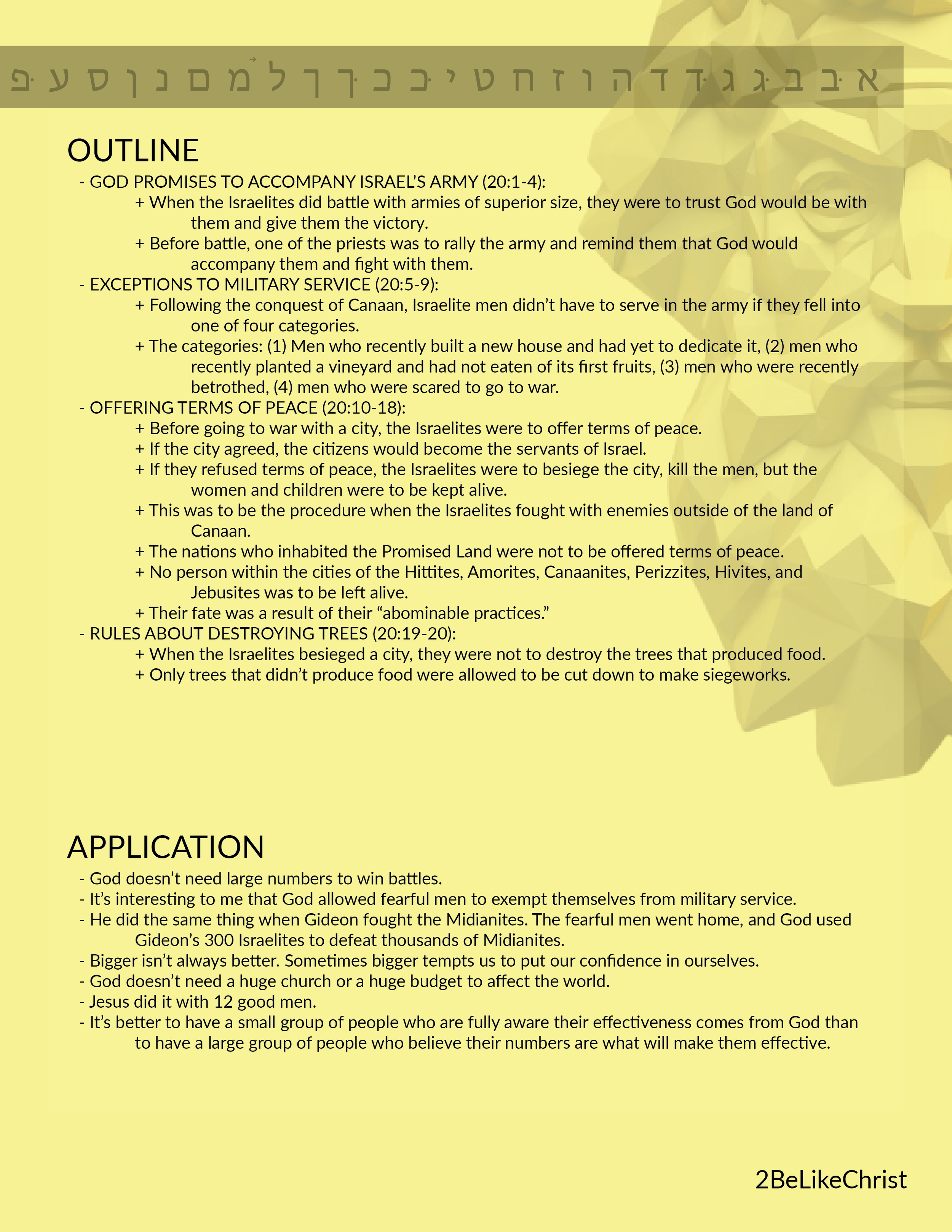Deuteronomy 20 Summary - 5 Minute Bible Study
Deuteronomy 20 Summary - A Quick Overview
WHEN:
Moses’ speech, recorded in the opening chapters of Deuteronomy, occurred immediately following the Israelites’ 40 years of wandering in the wilderness.
The Israelites were in the wilderness from approximately 1490-1450 B.C.
The Book of Deuteronomy opens on the 1st day of the 11th month in the 40th year (Deu 1:3) following the Israelites departure from Egypt (approximately 1450 B.C.).
CHARACTERS:
Israelites (Hebrews) – The descendants of Abraham, Isaac, and Jacob. God granted them freedom after several hundred years in slavery in Egypt. Leading up to the book of Deuteronomy, the Israelites had spent 40 years wandering in the wilderness as they made their way to Canaan, the land God promised to give them as a home.
Moses – Moses was selected by God to lead the Israelites to Canaan. God spoke directly to Moses and Moses communicated God’s words and laws to the people.
WHERE:
Deuteronomy 1:5 tells us Moses spoke the words recorded in Deuteronomy while in Moab, probably on the plains of Moab near Pisgah (Numbers 22:1).
OUTLINE:
GOD PROMISES TO ACCOMPANY ISRAEL’S ARMY (20:1-4):
When the Israelites did battle with armies of superior size, they were to trust God would be with them and give them the victory.
Before battle, one of the priests was to rally the army and remind them that God would accompany them and fight with them.
EXCEPTIONS TO MILITARY SERVICE (20:5-9):
Following the conquest of Canaan, Israelite men didn’t have to serve in the army if they fell into one of four categories.
The categories: (1) Men who recently built a new house and had yet to dedicate it, (2) men who recently planted a vineyard and had not eaten of its first fruits, (3) men who were recently betrothed, (4) men who were scared to go to war.
OFFERING TERMS OF PEACE (20:10-18):
Before going to war with a city, the Israelites were to offer terms of peace.
If the city agreed, the citizens would become the servants of Israel.
If they refused terms of peace, the Israelites were to besiege the city, kill the men, but the women and children were to be kept alive.
This was to be the procedure when the Israelites fought with enemies outside of the land of Canaan.
The nations who inhabited the Promised Land were not to be offered terms of peace.
No person within the cities of the Hittites, Amorites, Canaanites, Perizzites, Hivites, and Jebusites was to be left alive.
Their fate was a result of their “abominable practices.”
RULES ABOUT DESTROYING TREES (20:19-20):
When the Israelites besieged a city, they were not to destroy the trees that produced food.
Only trees that didn’t produce food were allowed to be cut down to make siegeworks.
APPLICATION:
God doesn’t need large numbers to win battles.
It’s interesting to me that God allowed fearful men to exempt themselves from military service.
He did the same thing when Gideon fought the Midianites. The fearful men went home, and God used Gideon’s 300 Israelites to defeat thousands of Midianites.
Bigger isn’t always better. Sometimes bigger tempts us to put our confidence in ourselves.
God doesn’t need a huge church or a huge budget to affect the world.
Jesus did it with 12 good men.
It’s better to have a small group of people who are fully aware their effectiveness comes from God than to have a large group of people who believe their numbers are what will make them effective.


